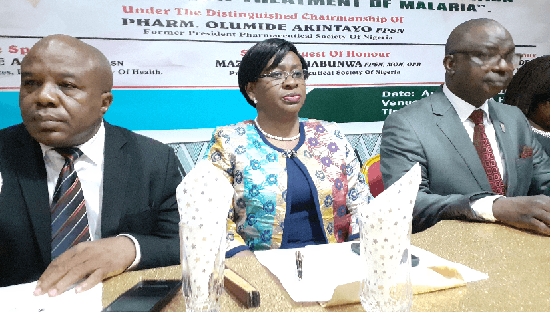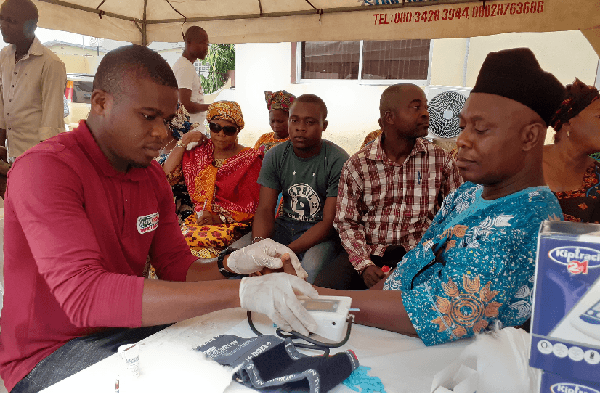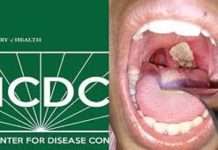-As Hospital Pharmacists Screen, Dispense Antimalarial to Bariga Residents
As Nigerians join the rest of the global community to mark the World Malaria Day, which is celebrated on 25 April of every year, reports have shown that Nigeria has the highest burden of malaria in the world with 97 percent of the total population approximately, 178 million people at risk of malaria infection.
More worrisome for the citizens was the absence of Nigeria on the newly released list of the World Health Organisation (WHO) of African countries to commence pilot programme of malaria vaccine, as Malawi took the lead recently, while Ghana and Kenya are to launch theirs soonest.

These and other issues were what informed the commemoration of the day in Nigeria among different groups, of which the Association of Hospital and Administrative Pharmacists of Nigeria (AHAPN) took the lead in Lagos, by enlightening and screening Bariga residents of the disease.
Speaking on the theme of the programme: “Zero malaria starts with me”, the keynote speaker, Dr Moyosore Adejumo, director of Pharmaceutical Services, Lagos State Ministry of Health, said it was apt as it called for collective efforts of all stakeholders, including government at all levels, professional bodies, healthcare workers at all levels, civil society organisation, communities, corporate organisations and even individuals to reduce the scourge of malaria in the country.
Although she acknowledged the implementation of different malaria intervention programmes, which produced significant reduction in mortality and prevalence of malaria in the country, she called for more investment and partnership in the prevention of malaria, in order to sustain more gains of such programmes.

Citing the Federal Ministry of Health report on Malaria, Adejumo asserted that 97 percent of the total population of Nigeria, approximately, 178 million people are at of malaria infection. She further stated that there are 219 million cases of malaria globally in 2017 with 435,000 deaths. While 93 percent of all malaria deaths occurred in Sub-Saharan Africa, children of under 5 years accounted for 61 percent of all deaths.
Coming to the malaria situation in Lagos, she said the malaria is responsible for more than 70 percent of outpatients’ attendance in the public health facilities, while over 400,000 cases are reported annually.
The Chairman of the occasion, Pharm. Olumide Akintayo, lamented the situation in the nation of about 180 million people, whereby 65 percent of its population, which amounts to almost 120 million people, expend about N120 million daily on the average to treat malaria, arguing that such waste which transcends to a whooping N43.8 billion expenditure on only core anti-malarial, a figure which might easily hit the N100 billion mark, if other additives including cost of analgesics, multivitamins and others are factored, need be addressed urgently.

Akintayo, who was represented by Pharm. Anthony Oyawole, further submitted that trends of things in the country suggest that the treatment cost in terms of medication needs alone revealed that almost 20 percent of the entire value chain that symbolises the pharmaceutical market is dedicated to drug treatment with anti-malarials, if the total value of the pharmaceutical sector is put at a realistic $2 billion.
Going forward on the elimination of malaria, the former PSN president, urged hospital pharmacists to align with other stakeholders to re-engineer the approach to malaria treatment in order to achieve zero prevalence of malaria.
In his own contribution, the National Chairman of AHAPN, Pharm. Kingsley Amibor, urged governments at all levels to provide necessary legal backing to the adoption of pharmaceutical care practice in Nigeria, which he explained has assisted a great deal in the prevention of several patients’ deaths worldwide, Nigeria inclusive.
Amibor noted the essence of Pharmaceutical care in the country, saying it is the responsible provision of drug therapy by pharmacists, to achieve definite outcomes that improve or maintain the quality of life of patients.
“Pharmaceutical care is patients centred and seeks to prevent drug related problems before they occur. Some of these drug related problems include adverse drug reactions, drug drug interactions and drug overdose”, he stated.
The AHAPN National Chairman, explained that the programme was organised as a collaboration between the national body of AHAPN and the Lagos State branch of AHAPN, and it featured among other things, malaria screening and treatment for diagnosed residents, panel discussion/interactive session, presentation of keynote address and sub theme at the programme.
The AHAPN Lagos State Chairperson, Pharm. (Mrs) Titilayo Onedo, stressed the need for more of such awareness programme in the country, saying if the populace is well enlightened on the causes of a disease, they would try to prevent it, as it is usually said, prevention is better than cure.
Onedo, who was the hostess of the campaign, stated the reason for the choice of Bariga Local Government Development Area, saying after conducting free kidney screening and awareness campaign at the Somolu Local Government Area, during the World Kidney Day in March, the residents of Bariga beckoned on the association to come over to their area for the next campaign, and thus, it became a reality.










